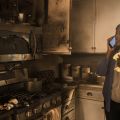How to Prevent Office Kitchen Fires

Commercial kitchen fires are nothing new, but they are something that need to be taken seriously. The National Fire Protection Association (NFPA) reports that from 2007 to 2011, 29 percent of office fires are caused by cooking equipment, causing 6 percent of property damage.
When a fire occurs in a workplace or business, it could translate to thousands of dollars in fire damage repairs and restoration, as well as a possible loss of livelihood due to losses in revenue. In addition, the process of returning the property back to its pre-fire condition may cause temporary or permanent business shutdown.
While professional fire damage restoration companies, such as ServiceMaster by Wright in Southwest Florida, could help restore the facility, fire prevention is still the best way to prevent incurring expenses from repairing the damage.
In this article, ServiceMaster by Wright discusses six important safety tips to prevent office kitchen fires to protect the employees and the business.
Six Tips to Reduce the Risk of Office Kitchen Fires
- Never leave cooking food unattended. Accidents happen when employees leave the kitchen while cooking something, so it must be emphasized that they should stay near kitchen appliances while food or beverages are being cooked or heated. Any sign of malfunctioning in an appliance must immediately be reported to have proper measures performed on the equipment. Also, employees must watch out for any signs of smoke or overcooking in order to keep themselves and the building safe from the threat of a fire.
- Inspect power cords. Power cords are a common sight in the office and, just like every other item, eventually go through wear and tear. This causes their soft coverings to become frayed and expose the inner wires, which can short out and cause a fire. To prevent this, employees must replace frayed or damaged power cords as soon as they are noticed. Cracked cords must never be used as they put the office at risk.
- Plug kitchen appliances directly to a wall outlet. Do not use an extension cord. Also, do not forget to unplug small appliances when they are not in use.
- Maintain kitchen appliances regularly. Cooking can get messy at times, and grease can build up over time, which is a fire risk. Food spillage should immediately be removed to prevent food particles from sticking to surfaces. Wipe down toasters, ovens, microwaves, and other appliances regularly to prevent accidental kitchen fires.
- Train employees how to properly use a fire extinguisher. Despite preventive efforts, fire accidents can still happen, so make sure that employees are knowledgeable about the usage of a fire extinguisher. There is a class of fire extinguisher for every type of fire:
- Class A - used for ordinary combustible materials, such as paper, cloth, and wood
- Class B - used for flammable liquids, like oil, grease, and gasoline
- Class C - used for electrical fires
- Class D - used on combustible metals
- Class K - used for commercial cooking equipment and cooking media, such as fats or oils
immediately exit the building and call the fire department and emergency services.
- Follow manufacturer's recommendations for surge protectors, adapters, power strips, and other office equipment. Mishandling or improperly using electrical elements can be a fire risk.
Commercial Fire Damage in Florida?
ServiceMaster by Wright is an IICRC-certified firm, which means that we apply cutting-edge industry practices and techniques that give us a competitive advantage over other restoration companies. We have also passed the screening process and met qualification requirements to be listed as Preferred Insurance Claim Vendors for some of the top national insurance companies.
Contact ServiceMaster by Wright at 239-431-9947 for your fire damage restoration and repair needs today. Our emergency response team is available 24 hours a day, 7 days a week, and 365 days a year to cater to your needs.
Related items:
 11/4/2021
How To Put Out Different Classes of Fires
11/4/2021
How To Put Out Different Classes of Fires
 8/25/2021
How to Deal With a Sewage Backup in Your Business
8/25/2021
How to Deal With a Sewage Backup in Your Business